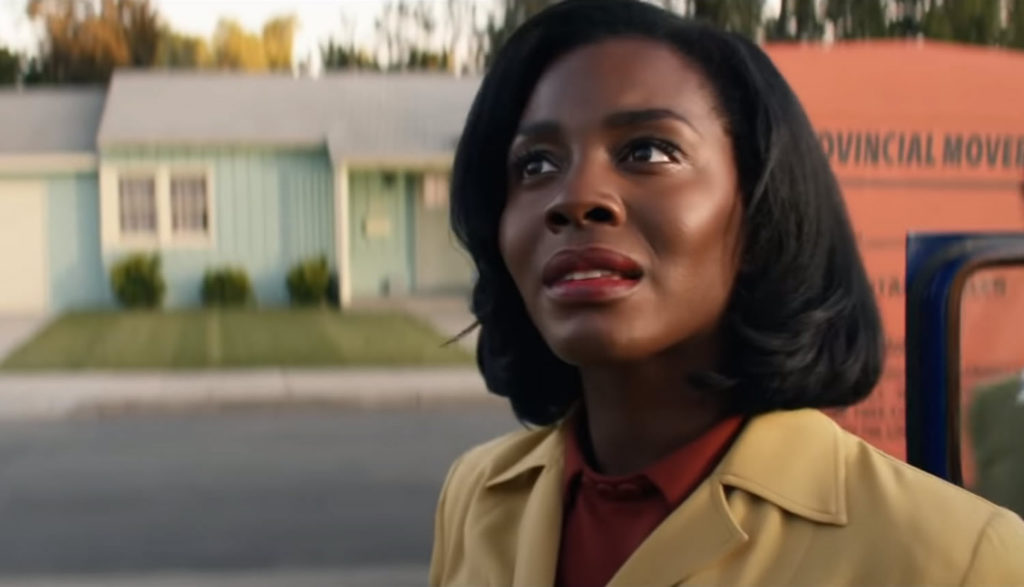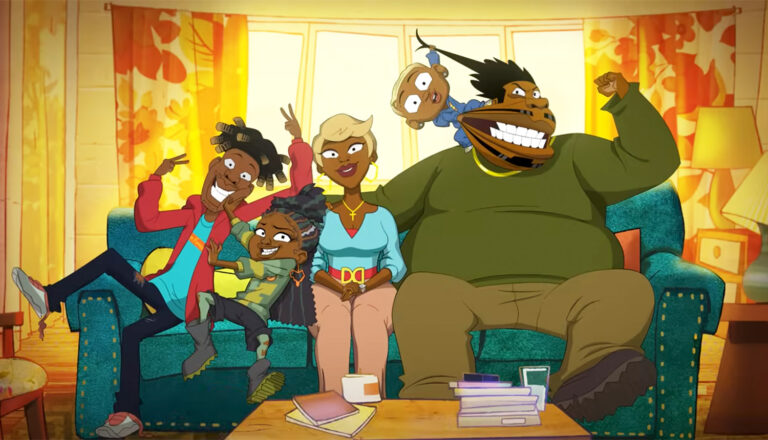
In the opening episode of Them, a bevy of women gather around a lemon meringue pie, circa 1953. They smoke and giggle and, most especially, plot how to get rid of their new Black neighbors, freshly escaped from the Jim Crow South.
“Getting them out won’t be easy,” blond Betty Wendell says, a tendril of smoke curling above her head. “We’ll have to make this place worse.”
And so they do—with a little help from the place itself.
Betty can’t know just what “worse” might look like. The Emorys—the Black family that just moved in next door—know full well that “worse” could be very, very bad indeed.
But the Emorys don’t want to dwell on their horrific past. This freshly built neighborhood in Compton, California, represents a fresh start—a place to pack all the terror they came from and cram it in a corner, never to think of it again. Never mind that the deed to the house came with a clause stating that “no persons of Negro blood” could live there. No matter that the neighbors are about as welcoming as crocodiles are to a stray family of wounded gazelles.
They’ll face the region’s racism a day at a time with pride and courage: Henry, working as an engineer at a local plant, will be quietly excellent and earn his fellow coworkers over. The Emory daughters—11-year-old Ruby and little Gracie—will study hard to make a better life for themselves. And Livia—whom Henry calls Lucky—will make a beautiful home for them all.
But if they’re determined to stay, the neighbors are just as determined to push them out: They’ll scare, hurt, even kill if they have to.
Then there’s this supernatural twist: While the folks outside the Emorys’ front door want them to leave, something in the house—down in the basement—wants them to stay. And stay forever. And if those two threats weren’t enough to terrify any self-respecting family, well, there’s always the Emorys’ own tragic past that may crawl out of a box and swallow them whole.
Truthfully, though, the Emorys aren’t the only ones threatened. The show may bite its viewers, too.
Looking at the promotional material for Amazon Prime’s Them, you’d be justified in thinking it might be a sequel to Jordan Peele’s 2019 Us. Amazon does its best to make us think so.
While both address racism in the crucible of horror fiction, the similarities largely end there. Them—which Amazon intends to be an anthology series (à la American Horror Story) and the first season of which is subtitled Covenant—has nothing to do with the plot of Us. And it’s not in the same zip code in terms of either its thoughtfulness or quality.
Peele’s horror movies can be incredibly problematic, but the content comes with a purpose. And while I certainly think they could’ve conveyed the same message with a lot fewer problems, I’d hesitate to call either Us or its acclaimed predecessor, Get Out, particularly gratuitous.
Them cannot make the same claim. And because of its really gratuitous horrors, the show undercuts its own message.
Don’t just take my word for it. Refinery 29 calls a near-lynching “one of the most upsetting and unnecessary scenes you will see in 2021, if not in your lifetime.” The L.A. Times wondered in a headline, “Does [Them] Go Too Far?” A critic from the Houston Chronicle writes that she couldn’t watch past episode five. The headline on her opinion piece gets right to the point: “Them is despicable and should be removed from streaming services immediately.’”
The show features diabolical forces and serial killers, infantcide and the threatened rape of an 11-year-old. People lose fingers, their sanity and, all too frequently, their lives. The Emorys are subjected to a litany of horrors no one should have to endure. By proxy, so are the viewers.
Them doesn’t just depict violence. It lingers on it, practically revels in it. The creators wanted to force viewers to confront the nation’s racist past. But their creation goes beyond that stated goal.
Again from the Chronicle: “Black directors and producers need to rid themselves of the notion that content like this is ‘pushing the envelope’—it’s just bad television.” It’s one thing to tell a difficult story. It’s another to tell a sadistic one.
The Emorys move to an all-white neighborhood in Compton, California, much to the horror of their neighbors. The day after Henry Emory signs the deed and heads off to work, the women of the neighborhood set up chairs and tables in front of the Emorys’ house and blast music from sunrise to sunset (forcing Lucky Emory to take her children to the bus stop via a back way). But at a neighborhood party later on, the neighbors make it clear that their assaults on their new neighbors are only beginning. Meanwhile, something seems to be seriously amiss with the Emorys’ basement.
In a flashback, we see a snippet of the Emorys’ old life in North Carolina: An old woman sings an initially lovely but ultimately racist song as she walks toward the front door. When she hears Lucky’s baby son in the background, she asks if she can have him. (When the Emorys arrive in Compton, there is no baby boy.)
The neighbors plot to kill the Emorys’ dog via a “bleached bone.” The dog is later found dead, but not poisoned: The head of the pooch is found in the Emory basement. Gracie, the youngest Emory daughter, talks about a “Miss Vera,” a character from a book she reads. She’s later choked by an apparent spectral entity. When Lucky spots the lacerations and bruises around Gracie’s neck, Gracie claims that “Miss Vera” did it. Lucky seems to imagine, or have a vision, of her slapping Gracie across the face. She stops before she strikes in real life, but Gracie asks her, “You’re not crazy anymore, right, Mama?”
Neighborhood men grumble about the other Emory daughter, 11-year-old Ruby, seducing their sons (making some slightly suggestive comments as they talk). Lucky and Henry kiss and cuddle at times. When Lucky asks Gracie how she got her name, Gracie recites the family story: “’Cause when Daddy first saw me, he said ‘Amen!’”
We see many racial slights and hear racial jokes. Neighbors ponder whether to scatter thumbtacks over the Emorys’ driveway but wave it away as far too mild. According to the Emorys’ deed to the house, anyone of “Negro blood” is not allowed to live there. (The agent waves the stipulation away, saying that such covenants aren’t enforceable anymore.) Several white neighbors hang outside the Emory house well past midnight, and a fearful Lucky spends that time loading a gun at the kitchen table.
Characters drink (sometimes heavily) and smoke. They say the f-word seven times (a few with the word “mother”) and the s-word once. Other profanities include “a–,” “b–ch,” “d–n” “p-ss” and “n—er.” God’s name and Jesus’ name are both misused once. The slur “cracker” is used, too.


Paul Asay has been part of the Plugged In staff since 2007, watching and reviewing roughly 15 quintillion movies and television shows. He’s written for a number of other publications, too, including Time, The Washington Post and Christianity Today. The author of several books, Paul loves to find spirituality in unexpected places, including popular entertainment, and he loves all things superhero. His vices include James Bond films, Mountain Dew and terrible B-grade movies. He’s married, has two children and a neurotic dog, runs marathons on occasion and hopes to someday own his own tuxedo. Feel free to follow him on Twitter @AsayPaul.

An elf mage contemplates on connection and regret as she watches her human friends grow old and pass away.

Netflix takes a classic sitcom, Good Times, and turns it into a vulgar, violent, sexually-charged TV-MA show.